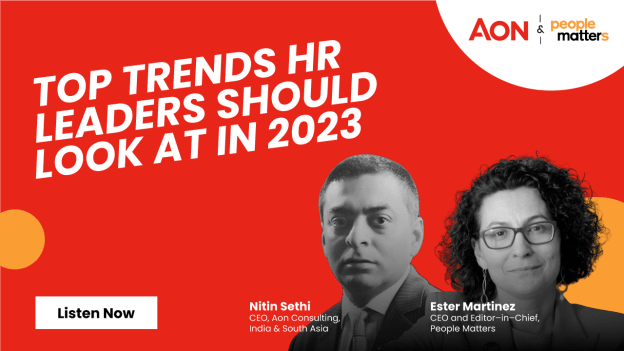HR Leaders, don’t put off fixing your talent strategy till tomorrow!

To say that the business landscape has gone through the most challenging time in the last three years would be an understatement, with some of the biggest companies laying off thousands of employees at the end of 2022 to brace themselves for an uncertain economic climate.
As business leaders, it’s important to reflect upon our learnings from the past year and identify key focus areas to make 2023 a better, more successful year. To deliberate on talent trends and opportunities that are likely to impact the industry and explore impactful strategies for staying agile, People Matters’ CEO and Editor-in-Chief Ester Martinez spoke to Nitin Sethi, CEO, Aon Consulting, India & South Asia on his insights and observations on the Top Trends HR leaders should look at in 2023. Here are some exclusive insights for you.
Paradoxes, constraints and more
“When we (will) look back at this decade, after a few years from now, we will call 2022 the year of paradoxes and constraints. We started the year with “revenge tourism”, “revenge buying” and by the time we closed the year, there was a bit of caution in the air along with global inflation issues,” Sethi told People Matters in this exclusive interview, adding that India continues to retain some degree of optimism and that most Indian leaders are bullish about where India could be.
Emerging operating models from a people and talent perspective
As the world of people and work continues to undergo one disruption after another, there is a shift in how organisations view work itself. Talent leaders have the opportunity to create agile and innovative operating models based on customer requirements, as opposed to processes. Does this signal the death of the traditional way of working? Are there any new operating models emerging, especially from a people and talent perspective?
“Fundamentally, consumer behavior and employee expectations have changed and that has downstream implications on the talent model” he said.
“Future talent models would be ones that would be driven by businesses. There will not be just one method of working, there will be a number of talent models and the best companies will be those who use multiple talent infrastructures to deliver value to their customers,” Sethi added.
In the next 3-5 years, he observed, organisations would need to build jobs that are unique to an individual’s skill set and that will fundamentally change how organisations structure, pay and reward employees.
Generalist > Specialists
Another interesting point Sethi made during the interaction was about the imminent rise of generalists. “Till now businesses have always run to hire specialists. But I think the future will see more focus on generalists rather than specialists. Generalists have an amazing ability to go in deeper and still look around to see what is working, what isn’t and then link things to create greater value, and that will be of great importance,” he cited.
Building talent rather than buying it
Sethi also spoke about how over the past few decades, organisations that have managed to build talent have been much more successful than organisations that bought talent.
“As the world of work changes, it will become very important to be able to hire talent that has learning ability as a skill set, rather than just meeting your technical requirements. This is because you can use that talent agility to keep reskilling,” he felt.
“I believe capital will always be available and that shortage of talent will be the bigger issue to deal with – talent will be the constraint for growth,” Sethi explained.
Building employee engagement the right way
“Data shows engagement scores have fallen across geographies. Personally, I would break engagement in two things – the ‘core factors’ that really matter and the ‘fashionable stuff’ that companies end up doing just because others are doing the same thing.”
“We come to work because we want to be happy about the work we are doing, learn, grow and share our achievements. Companies that are focused on how they can enrich the job, how they can make the job good enough for future talent as well are the ones that are succeeding in creating the highest levels of engagement,” he said.
Finding your “core”
How does a company define its core values in order to build employee engagement in a sustainable way?
“The value proposition would depend on every company, one organisation may see itself as a cradle-to-grave company, another may see itself as one that provides global opportunities. You have to be at the base threshold at the median of the market in just about every area and then uniquely differentiate yourself in some of the others,” he said. “Some companies differentiate themselves by focusing on careers, some companies are known as CEO factories and so on.”
What does HR need
“I think there is a need for more business talent to come into HR. Many companies move talent between, say, sales and marketing. Why not HR? Over the last two years, as organisations have realised that talent will be the key differentiator, they have made some of their best employees as Chief People Officers. Further, there are examples of CPOs going on to become CEOs,” Sethi asserted.
“Companies that deploy talent as effectively as capital will be the ones that will succeed,” he added.
Skills HR leaders need to focus on
“CHROs need to see themselves as leaders of businesses. They should try and develop business understanding, and build a strategic mindset. Design thinking is another critical skill to have as companies undergo a change in their systems, processes, talent architecture,” Sethi said while talking about the critical skills CHROs need to focus on cultivating.
I think a very important quality that all HR leaders must possess is empathy. Further leaders need to be persuadable and be very agile when it comes to learning new things,” he said.












